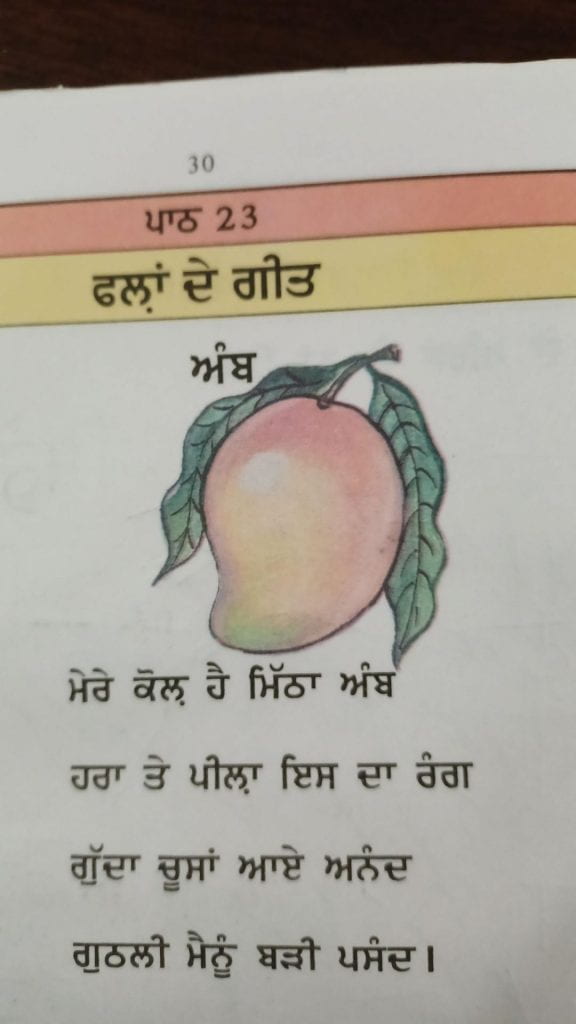My Progress
My progress so far has included learning the alphabet, reading, speaking, and counting. Most of this was a review which allowed me to speed through each subject faster than I was expecting. I have made changes to my plan to accommodate my faster pace, and I will begin first-grade reading comprehension and writing practice.
I began my session with my mentor by reviewing the alphabet and practicing proper pronunciations for each letter. I had little trouble with this task because I knew the Punjabi alphabet. However, I faced a slight challenge when practicing the letter sounds. Punjabi has a powerful accent compared to English, and I struggled to put an ample amount of emphasis on each sound because it felt unnatural. I overcame this slight setback by practicing.
Then I progressed to reading simple words. I practiced reading and speaking words without vowels and then words with each of the twelve vowels in Punjabi. I spent two weeks learning and practicing my reading skills. The first week was spent going over the different vowel sounds and combining them with letters and other vowels to create many different words. The vowels that I found challenging to learn were kannaa which creates an “aa” sound as in “awe” or “paw,” and lavan, which creates the “ae” sound as in “rain” or “hay”. I frequently mixed up these two vowels sounds because they were very similar. I overcame this challenge by relating each sound to a similar sound in English, which allowed me to grasp and better remember the difference between the kannaa and lavan. After mastering each vowel, I started reading small poems to increase my fluency and proficiency. I found reading poems to be a helpful tool when learning to read because many of them consisted of rhyming couplets and had a rhythm, which made it easier for me to gain a flow while speaking.
This an example of a poem I read

By working with my mentor while learning Punjabi, I have also picked up some strategies my mentor uses while teaching that will help my development as a mentor. For example, I learned that a mentor acts as more of a supervisor than a teacher, allowing the mentee to discover and learn independently and only stepping when they are stuck or ready to move on to the next topic. My mentor helps guide me through challenges by asking questions that encourage me to think deeply and critically to overcome struggles instead of holding my hand to get through the difficulty.
A piece of wisdom I have gained from my mentor is that learning a new skill, especially a language, takes a great deal of time and dedication. Mastery cannot be obtained in a skill with only a half-hearted effort, so I must be fully invested in learning and practicing Punjabi. Dedication is being committed to reaching my goals and practicing every day to ensure I achieve them in a timely manner. However, cutting corners to reach milestones faster will only give surface-level understanding, which gives a false sense of proficiency in a skill. Deeply studying and understanding my skill will allow me to gain confidence in my abilities and use it in real life.
My next steps will be to begin first grade reading comprehensions and writing practice. Reading comprehension will allow me to gain a better understanding of text, allowing me to add emotion to my final story when I record it. Also, reading will help build my vocabulary. I will also begin writing practice which will begin with a review of writing the letters and vowels. Then I will learn about different tenses.
My Mentor
My mentor was able to gain her expertise at speaking Punjabi by speaking the language for her entire life. My mentor was born in Punjab, India, where she learned to speak the state’s official language, Punjabi. She later received her Master of Arts and Bachelor of Education degrees before becoming a secondary school teacher. My mentor taught Punjabi for over nine years, making her highly accustomed to teaching Punjabi.
Punjabi was my mentors first language. It holds great value to her since it is her mother tongue, and she grew up speaking the language. She believes that your first language is the most valuable as learning starts at home not in a school. My mentor wanted to teach Punjabi so she could share her knowledge with the youth, in hopes of them passing on the Punjabi to their children.
“Teaching a language is not easy, it takes many steps and knowledge must be built up over many years. However, language is a skill students will use every day for their entire lives and having the opportunity to teach them this essential skill brought me great joy.”
Daljit Khangura